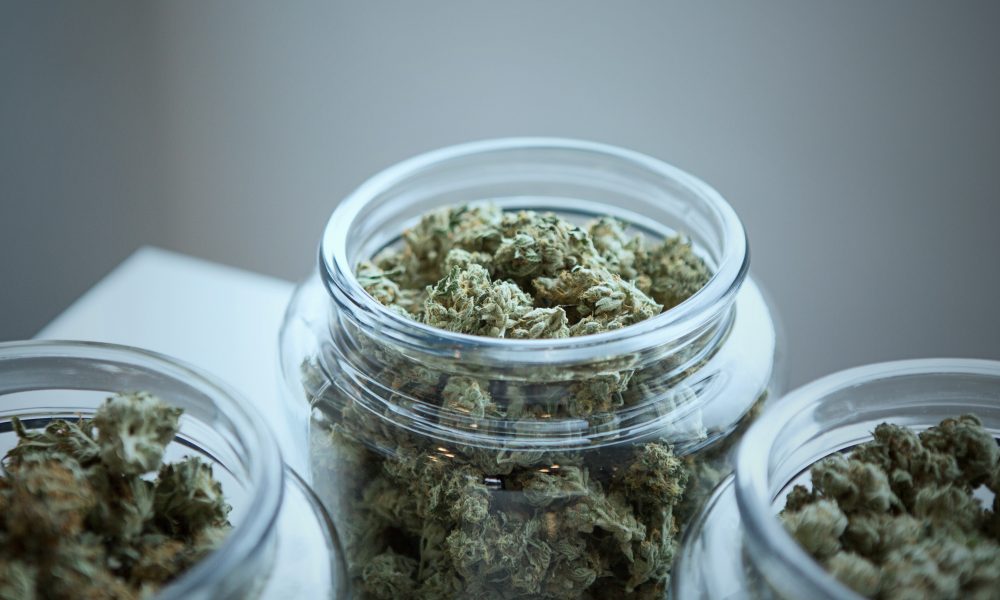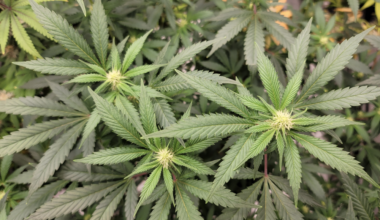A New Hampshire House committee approved an amended version of a bill to create a state-run marijuana market for adult consumers, sending it to the full House for a second floor vote.
The House Ways & Means Committee met for the third time in the span of a week on Monday to discuss the proposal and gave it a “do pass” recommendation in a 12-10 vote. There was a fourth meeting to discuss the measure scheduled for this Wednesday, when a vote was initially expected, but members decided to go ahead and take action sooner instead.
This legislation already cleared the chamber this month, but because it involved economic components, it needed to go to the Ways & Means Committee before it could be taken back up on the floor. If the chamber passes it again as amended, it will be transmitted to the Senate.
While advocates have spent years pushing for an end to cannabis criminalization and a regulated market for adult consumers, the idea of a first-in-the-nation, government-run cannabis market has left many stakeholders with reservations.
Prior to the vote, the House panel on Monday specifically discussed issues such as the potential revenue that taxing and regulating cannabis would bring to the state.
—
Marijuana Moment is already tracking more than 1,000 cannabis, psychedelics and drug policy bills in state legislatures and Congress this year. Patreon supporters pledging at least $25/month get access to our interactive maps, charts and hearing calendar so they don’t miss any developments.![]()
Learn more about our marijuana bill tracker and become a supporter on Patreon to get access.
—
An amendment from Rep. Timothy Lang (R) was adopted unanimously in a 22-0 tally ahead of the vote on sending the revised legislation to the floor.
It contains components—such as removing a proposed 15-license cap for privately owned cultivation businesses that would supply the state-run stores with product—that some advocates and stakeholders appreciate. But representatives of New Hampshire’s current medical cannabis industry still feel that lawmakers are advancing legislation that would dramatically impact their viability in the market.
The amended bill also prevents adult-use consumers from buying “infused” cannabis products like edibles, which some advocates view as unnecessarily restrictive, especially considering that medical cannabis patients are permitted to purchase edibles at the limited number of operating dispensaries in the state.
Matt Simon, director of public and government relations for Prime Alternative Treatment Centers of NH, told Marijuana Moment that the amendment represented a “good faith effort” to improve on the the legislation, but he feels strongly that the bill remains unworkable from the standpoint of the state’s medical cannabis operators.
“I appreciate that representatives are trying to fix this bill, but I think that the task that they’ve undertaken is insurmountable in the time allotted,” he said.
When the panel met previously, on Friday, members also discussed startup costs for the state, potential supply chain issues and wages for state employees working in stores that sell cannabis.
The bill, sponsored by Rep. Darryl Abbas (R), passed the full House last month in an initial vote of 235-119 before being sent back to committee. Somewhat surprisingly, the proposal received bit of praise from Gov. Chris Sununu (R), who despite being a historically outspoken opponent of adult-use legalization, said this month that reform “could be inevitable” in the state and that HB 1598 is “the right bill and the right structure.”
“So if you are ever going to do it, do that bill,” he said.
The governor added in a separate recent interview that he’s “not fully committal” in his longstanding opposition to legalization.
Despite the unexpected quasi-endorsement from the governor, however, both the Senate majority leader and minority leader recently said they don’t think now is the time to legalize—raising serious questions about the legislation’s path to Sununu’s desk if it officially clears the House again.
The bill outlines a model where all cannabis dispensaries in New Hampshire would be operated by the state under the State Liquor Commission. It currently proposes a cap on the number of grow licenses, and it does not include home grow provisions. Adults could possess up to four ounces of cannabis under the law.
State regulators would have until October 1 to adopt rules for “the registration and regulation of cannabis establishments and cannabis cultivation facilities.” They would then have another two months to create regulations on issues like advertising, labeling, civil fines, security and THC limits.
Advocates for cannabis legalization in the state have been vocal about their concerns with the legislation, saying both the state-run model and imposing a limit on cultivator licenses as proposed in the bill would prevent New Hampshire from reaping the full benefits of legalization in their state. And specifically, some worry that the proposal would effectively kneecap the existing medical cannabis market.
The Friday session focused largely around testimony from Joseph Mollica, chair of the New Hampshire Liquor Commission, and Patricia De Meers, the commission’s CFO, who prepared a fiscal note for the committee to assess the startup costs, profit projections and other financial concerns. As they were peppered with questions, Mollica indicated that a fiscal note his office filed at the request of the House was “unbiased” and that the Liquor Commission took a neutral stance on the issue.
The analysis indicated that, with ten stores strategically placed around the state, New Hampshire stands to generate $50 million dollars annually after three years of implementation. It also projects that regulating ten cannabis dispensaries will cost the state around $14 million annually after the market matures, with $5 million of those dollars going toward implementation for the first year’s startup costs.
However, during the work sessions, some lawmakers and regulators tempered expectations about how much revenue would be created for the state.
Both the Liquor Commission’s Mollica and Vice Committee Chairman Patrick Abrami (R) said infused cannabis products would account for an estimated 35-45 percent of retail sales, meaning the $50 million projection that included anticipated edibles sales is too ambitious for the adult-use market if those products end up being banned.
“Should edibles not be allowed, you should subtract that from the total revenue projection,” Mollica said.
Rep. Tom Loughman (D) separately brought up supply chain issues on Friday, noting that the some 650 growers that supply legal cannabis dispensaries in neighboring Maine “are still struggling to keep up with demand,” while the bill as initially passed in the House included a 15-grower limit. Mollica agreed that capping the number of cultivators would be bad for the state.
That cap was removed under Lang’s adopted amendment.
“From a business perspective, I don’t think limiting the number of licenses is the way to succeed,” Mollica said. “[Granite-staters] are naturals for this business… We have the farms, we have the space, we know how to grow and this will put some dollars in small farmers pockets.”
Rep. Thomas Schamberg (D) echoed this, suggesting the state should “rely on licensing criteria to determine who gets approved and have no limit to the number of growers.” Mollica added that a cap on the number of growers licenses would “show favoritism” to factory farms and cannabis industry giants as opposed to local farmers, who could be guided on quality control by a state-appointed inspection official.
There is no cap to the number of dispensaries in the current bill, but the plan is to open ten state-run stores within the first three years, which is what the fiscal analysis was based on.
Mollica also stated his office’s intention to “strategically place cannabis stores around the state borders” in order to attract out-of-state customers. When pressed by Ways & Means Committee Chairman Norman Major (R), as to the legality of this strategy, Mollica offered a rejoinder, citing the fact that 50 percent of the state’s retail liquor sales comes from cross-border traffic.
“We would expect to have the lowest prices in New England because there would not be a tax structure tied to it like there is in other states” he said. “I am certainly sure that we’re going to abide by the letter of the law, but at the end of the day, there are some personal rights concerns,” he said, adding that he does not expect New Hampshire law enforcement officers to “go around checking license plates in dispensary parking lots, since they do not do that at the liquor stores.”
The panel on Friday also heard from representatives of the Liquor Commission’s Division of Enforcement and Licensing. They discussed coordinating enforcement with state and municipal partners for marijuana businesses they would oversee and stressed the importance of educating the industry in advance to mitigate the risk of violations.
“Our partnerships with our municipal partners and state partners is overwhelmingly great,” Mark Armaganian, chief of the enforcement division, said. “Right now we are regulating the industry of alcohol and tobacco. This is very similar to that infrastructure” proposed for cannabis.
“We have proven that the education platform has been very, very adequate and having industry actually, in a different sense, support our endeavors,” he said. “The people we regulate like us—that’s different throughout the country.”
He also noted that he expects the need to hire at least eight additional staff on the enforcement end to ensure that the marijuana market would be effectively regulated.
Advocates and stakeholders have spent years working with the GOP-controlled legislature to craft thoughtful legislation to end cannabis criminalization, though diverging viewpoints and resistance from Republican leadership has consistently derailed the reform.
Activists are losing patience with lawmakers in the state, especially as they’ve moved to advanced controversial legalization options while stalling on their preferred vehicles.
A separate, non-commercial legalization bill passed the House in January, and it’s another example of legislation that’s fallen short of advocates’ expectations. It would allow adults 21 and older to possess and give away up to three-fourths of an ounce of marijuana and grow up to six plants, but it wouldn’t permit cannabis commerce.
The bill as introduced is nearly identical to an earlier version that also passed the House under Democratic control in 2020. The previous bill died in Senate committee.
To advocates, January’s House vote to pass Rep. Carol McGuire’s (R) home grow bill felt like a particular slap in the face, as it advanced one day after the chamber narrowly rejected a separate, broader legalization proposal that would have regulated commercial production and sales.
Meanwhile, three lawmakers—Reps. Joshua Adjutant (D), Renny Cushing (D) and Andrew Prout (R)—each filed separate bills to put marijuana legalization on the state’s 2022 ballot. Cushing, who served as House Democratic leader, passed away this month after a battle with cancer.
The House defeated Prout’s proposed constitutional amendment this month and voted to table the two other measures.
In order to have advanced any of the proposed constitutional amendments, it would have taken a supermajority 60 percent vote in both chambers. If any of the constitutional amendments were enacted, it would have enabled legislators to avoid a likely veto on statutory reform legislation from anti-legalization Sununu.
If legislators had ultimately moved to place a constitutional amendment to legalize cannabis on the ballot, 67 percent of voters would then have needed to vote in favor for it to be enacted. Recent polling indicates that residents are ready for the reform, with three in four New Hampshirites favoring legalization.
The governor’s opposition to adult-use legalization has been a constant source of contention. However, advocates were glad that he at least signed a bill in August adding opioid use disorder as a qualifying condition for the state’s medical cannabis program and also allows out-of-state patients to access dispensaries.
In 2017, Sununu signed a bill decriminalizing marijuana possession in the Granite State, though he continues to oppose adding a legal commercial cannabis sales component.
In 2019, lawmakers sent a medical cannabis homegrow bill to Sununu’s desk, but he vetoed it.
Meanwhile, other nearby northeast states such as Maine and Vermont have already legalized recreational cannabis.
Kyle Jaeger contributed to this report.
Senator Who Previously Opposed Marijuana Legalization Says He Was Wrong About Increased Youth Use
Medical Disclaimer:
The information provided in these blog posts is intended for general informational and educational purposes only. It is not a substitute for professional medical advice, diagnosis, or treatment. Always seek the advice of your physician or other qualified healthcare provider with any questions you may have regarding a medical condition. The use of any information provided in these blog posts is solely at your own risk. The authors and the website do not recommend or endorse any specific products, treatments, or procedures mentioned. Reliance on any information in these blog posts is solely at your own discretion.







